Chris Weber
Operetta Research Center
8 October, 2023
The last time this wonderful operetta by Charles Lecocq was performed in Paris was in 1984, at the Châtelet. I can’t tell you how wonderful it was, how exquisite. I heard a Frenchman say to his Japanese girlfriend, “This is our history”, as the changing costumes marked the change of years in one of the entr’actes.
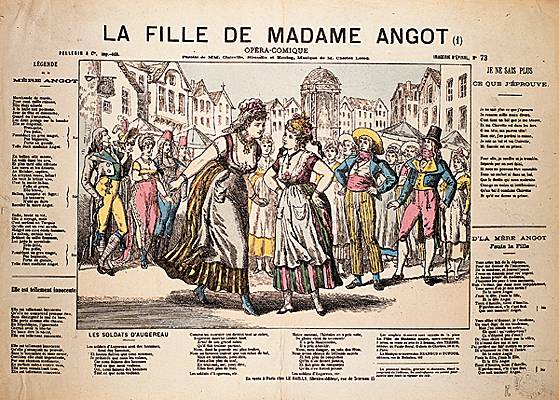
Scene from “La fille de Madame Angot” in a newspaper.
So when I heard there was going to be a run of La fille de Madame Angot at the Opéra Comique I bought tickets for four performances. It was very nearly sold out, so I thought I would move fast. Anything to recapture that rapturous feeling I had near on 40 years ago. I’d also seen the show in the late 90s at a provincial house (Rennes, I think). It was also very lovely.
But not this one! The piece is set during the 5-year period of French history known as the Directoire (Directory), where the rulers were very corrupt but at least they didn’t kill people like the period right before this, with Maximilien Robespierre and the Reign of Terror.
In retrospect, I should have seen the writing on the wall back the last time I saw it. The French woman, college educated, with whom I went had no idea about this period of the history of her country.
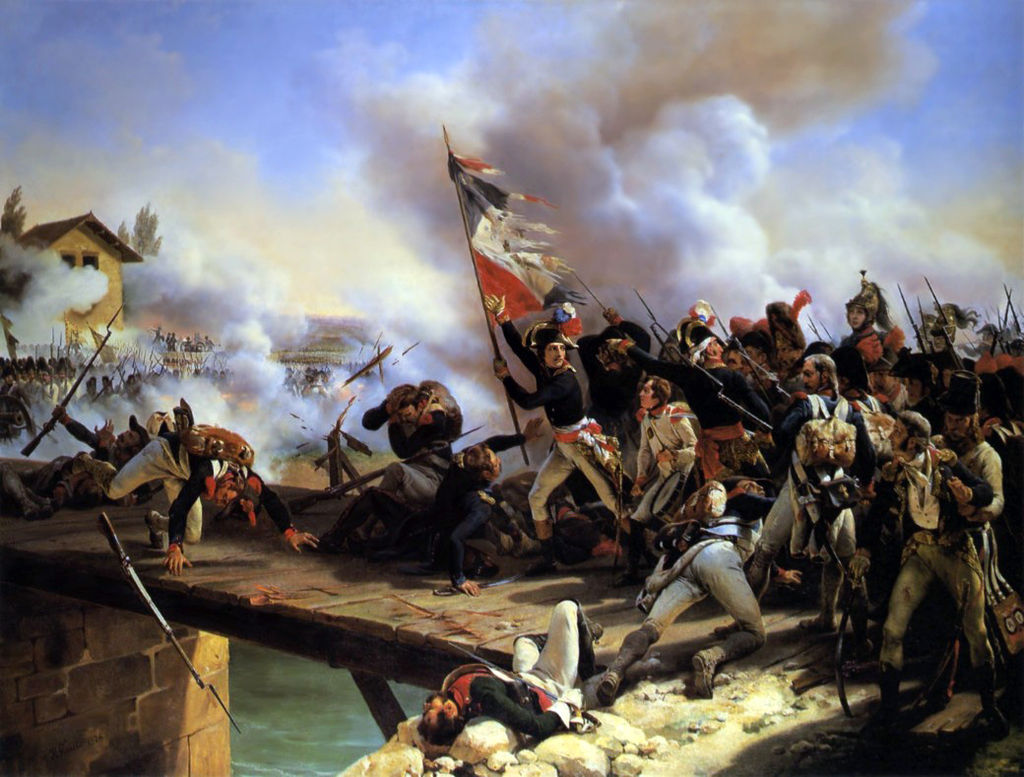
Bonaparte won his first major victory leading his soldiers across a bridge at the Battle of Arcole, November 1796. (Painting by Horace Vernet, 1826)
Indeed, it seems the textbooks now skip from the beheading of Robespierre in August of 1794 to the 18 Brumaire coup d’etat of Napoleon of 1799 where he took control of France as the First Consul, the preliminary step before becoming Emperor five years later.
But the 5 years of the Directoire were very interesting. France almost fought a war with the young United States, and would have too, had President John Adams not sacrificed his re-election chances by making peace and stepping back from outright war. That’s how popular war with France was in 1797.
Anyway, after the Franco-Prussian War was lost for France, the country wanted to escape to never-never lands and a more colorful past.
This is the story of how France had changed during those years. There was deep corruption in politics: one of the most famous songs asked, “Barras [one of the most corrupt leaders] is the new king. We had the revolution for this?”
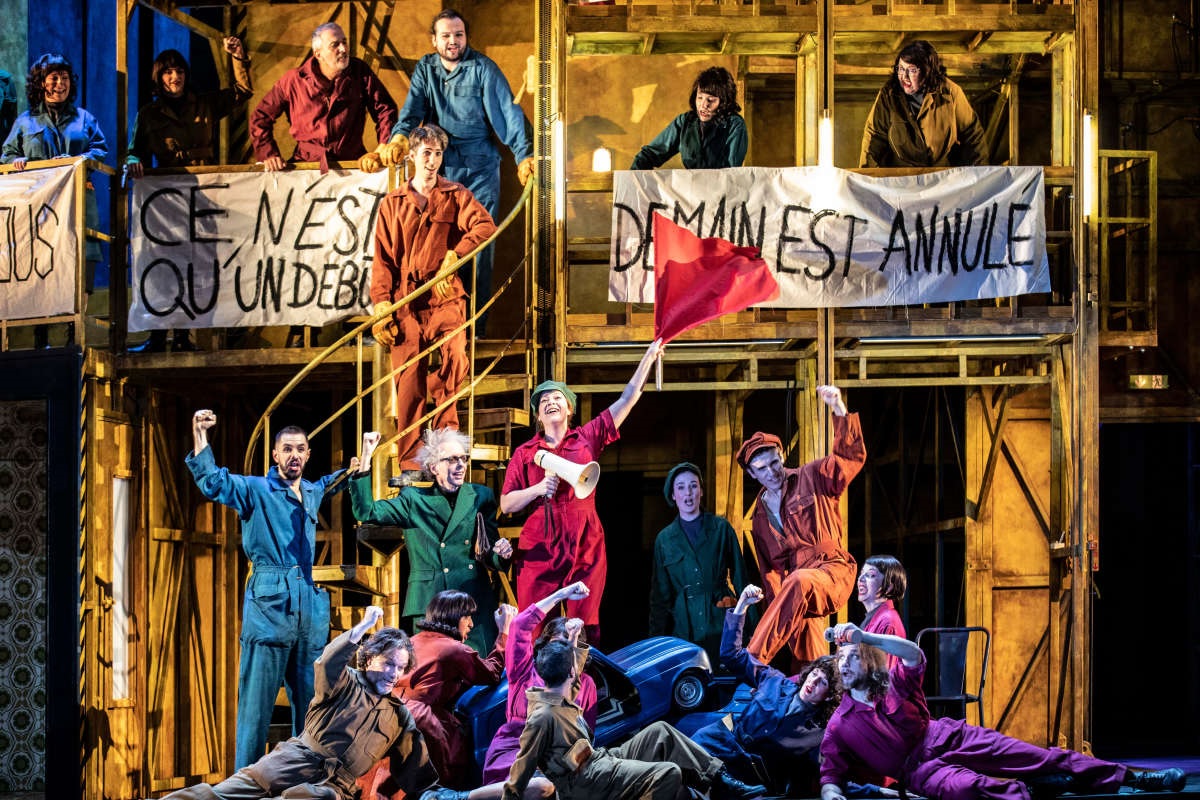
Scene from the 2023 “La fille de Madame Angot” in Paris. (Photo: Opéra Comique / Jean-Louis Fernandez)
Anyway, the Lecocq music is absolutely charming. The big difference between now and 1984 is that now we have horrible productions of things, but great and full recordings (click here for more details). This one now has one of the finest of all possible recordings, put out by the estimable Pallazzetto Bru Zane just two years ago in 2021. One of the singers is Veronique Gens, she sang Mademoiselle Lange on both the CD and now in the new stage production.
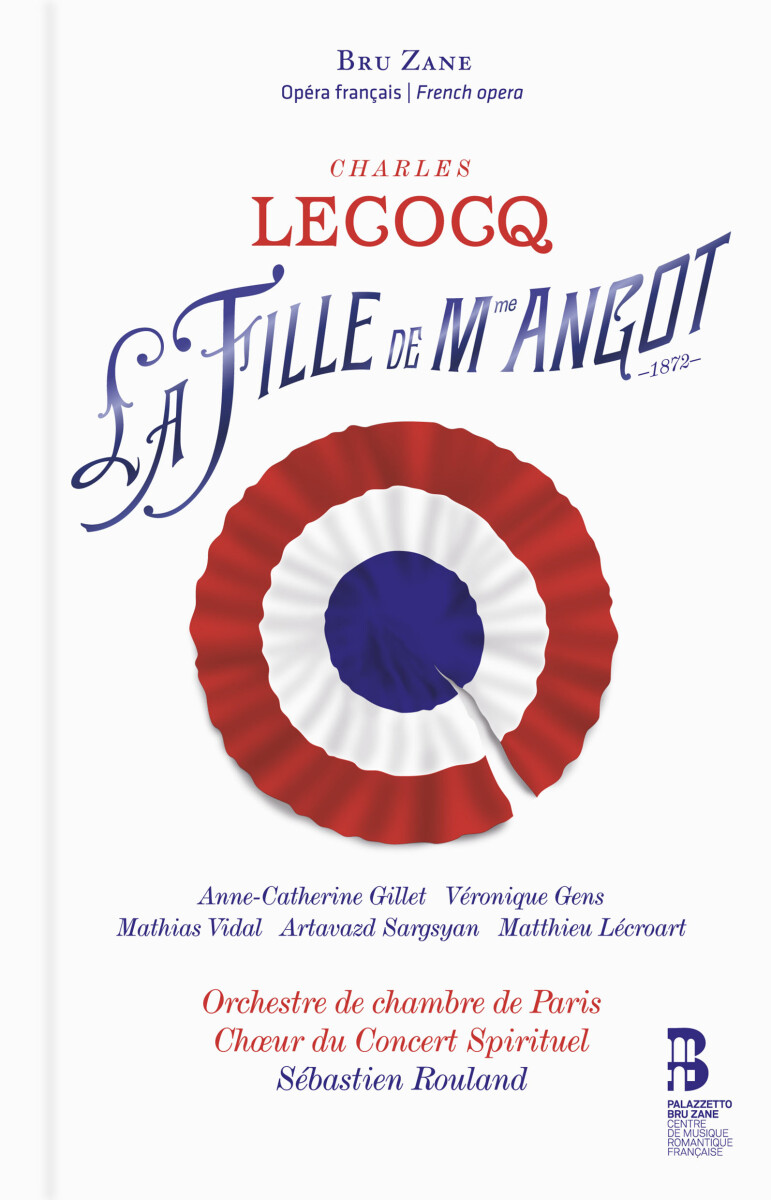
The Palazzetto Bru Zane version of Lecocq’s “La fille de Madame Angot.” (Photo: Palazzetto Bru Zane)
I’ll say right off that the production was disgusting. It was explained that since modern French people don’t know what the Directory was, the action was instead set during the “revolution” of May of 1968, and set inside of a car factory.
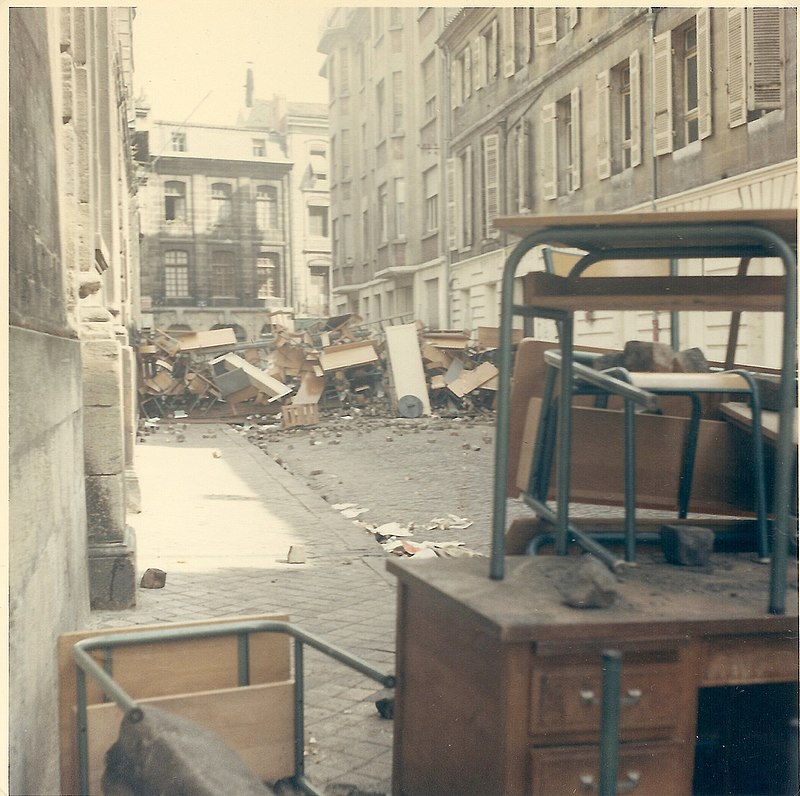
Demonstrations of May 1968 in Bordeaux. (Photo: Tangopaso / Wiki Commons)
What this has to do with the original show is quite beyond me. What I did not see was any charm, humor or wit.
Remember when I said I bought tickets for four performances? Well, I cleared out as soon as I could, which was right after the first act, or whenever they took the interval. I got out and kept on going. I never went back.
Sometime I thought about using one of the tickets again, but in the end I never could bring myself to do it. I am not a masochist, and neither did I want to give those tickets away because I am not a sadist either. There was no one in Paris I hated enough to inflict this show on them.
Kevin Clarke from the Operetta Research Center asked me to review the production, but how can I when during the short time I was there I just concentrated on the orchestra and the players (no one can mess those up) and bided my time before I could flee. Fortunately, most of the reviewers in the French papers agreed with me, but they had to see the whole thing.
La Monde wrote that it “makes its return without any surprise or emotion.”
Surprises I can take or leave, but to go to one of the most charming shows ever put on – Kurt Gänzl’s all-time favorite work for the stage: he wrote the wonderful review of the 2021 CD in these pages, to sit through this production and not feel any emotion? Why bother to leave your home? I honestly can’t comment on any of the singers. I was trying to avoid looking at what set, at what director Richard Brunel had put on, and at what costume designer Bruno de Lavenère had done. I don’t know who to blame most and I don’t really care … there’s no emotion left to care after they took it out of the evening. Too bad about the singers: they might have been actually good.
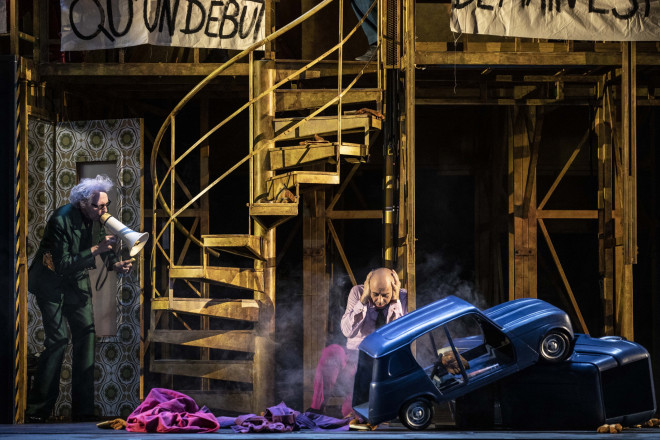
More “La fille De Madame Angot” in Paris 2023. (Photo: Opéra Comique / Jean-Louis Fernandez)
I didn’t see the second half and when I did see anything I just focused on the instrumentalists (fortunately I was in a box above the orchestra). The conductor was wonderful: you can’t destroy such a wonderful score. He was Hervé Niquet directing the Paris Chamber Orchestra (the same orchestra as on the Palazzetto Bru Zane recording).
I’m sorry that I can’t say more. Le Monde was spot on: Emotionally, I just wasn’t there.
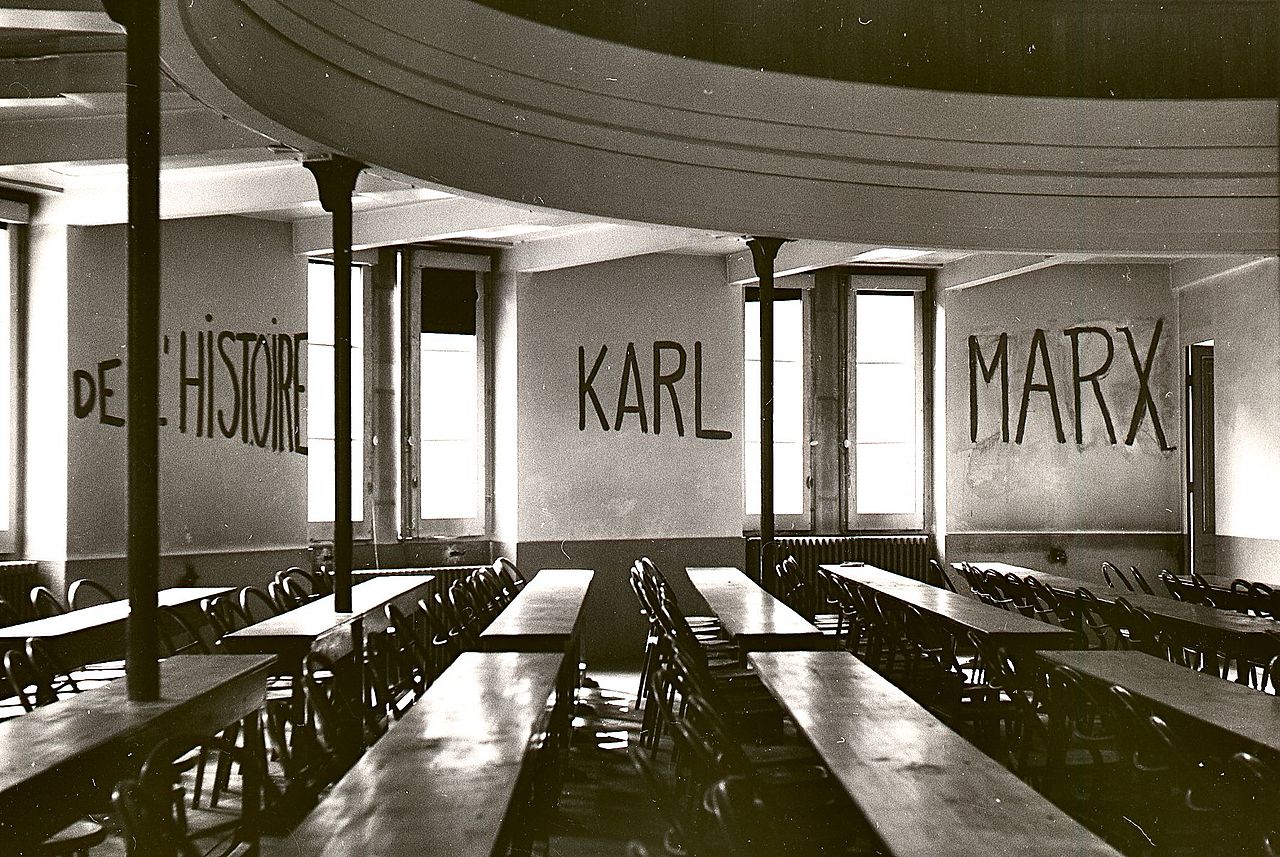
Class room at the University of Lyon with markings on wall, made during the student occupation of parts of the campus as part of the May 1968 events in France. (Photo: George Louis / CC BY-SA 3.0 Deed)
For more information and cast details, click here.
